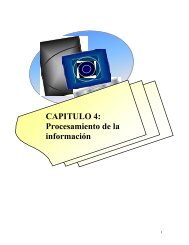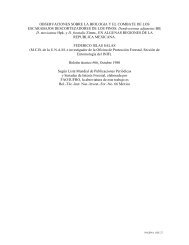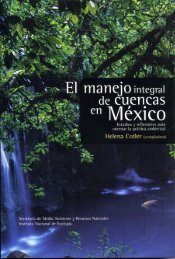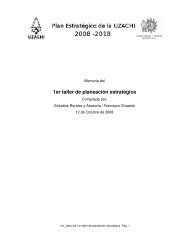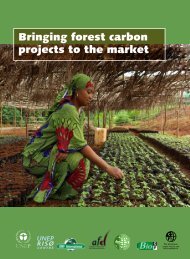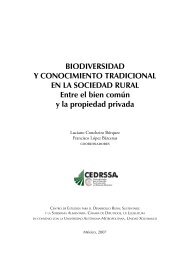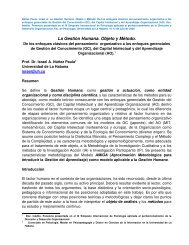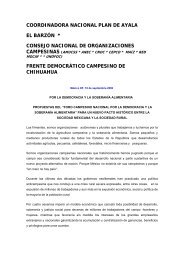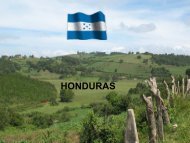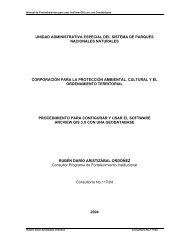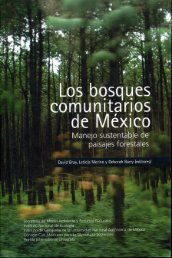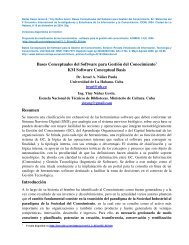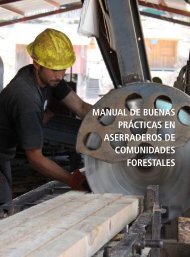STATE OF THE WORLD's INDIGENOUs PEOpLEs - CINU
STATE OF THE WORLD's INDIGENOUs PEOpLEs - CINU
STATE OF THE WORLD's INDIGENOUs PEOpLEs - CINU
- No tags were found...
You also want an ePaper? Increase the reach of your titles
YUMPU automatically turns print PDFs into web optimized ePapers that Google loves.
EMBARGOED UNTIL 14 January 2010<strong>STATE</strong> <strong>OF</strong> <strong>THE</strong> WORLD’S INDIGENOUS PEOPLESNot for distributionThe mandate of the UNFF has been to facilitate and promote the implementation of the Proposals for Action setup by the UN Intergovernmental Panel on Forests (IPF) and the Intergovernmental Forum on Forests (IFF). 72 In2007, the Forum adopted the Non-Legally Binding Instrument on All Types of Forests (NLBI), and a Multi-YearProgramme (2007-2015) with four measurable and time-bound global objectives to achieve sustainable forestmanagement. 73NLBI is the first ever inter-governmental instrument on sustainable forest management. It covers issues rangingfrom protection and use of traditional forest-related knowledge and practices in sustainable forest managementto the need for enhanced access to forest resources and relevant markets to support the livelihoods of forestdependentindigenous communities living inside and outside forest areas. 74Although UNFF recognizes the role of indigenous peoples in achieving sustainable forest management, indigenouspeoples’ organizations and civil society have generally been disappointed by the UNFF, which does not build onthe open and progressive practices of the IPF/IFF and CSD. 75 They have also widely criticized NLBI for failing torecognize, respect and support the implementation of customary rights of indigenous peoples who live in anddepend on forests and for failing to comply with best practices in environment management. 76UNCCD and UNFCCCIndigenous peoples also participate in the COPs of the Convention on Desertification (UNCCD) and the FrameworkConvention on Climate Change (UNFCCC). However, they are admitted only as observers, not as peoples. In thecase of the UNFCCC, for instance, they have participated since 1988 in the COPs and have released a numberof statements and declarations expressing concerns regarding the implications of climate change policies ontheir livelihoods and cultures. Since 2001, indigenous peoples’ organizations have been acknowledged as aconstituency in climate change negotiations within UNFCCC. At the same time, however, indigenous peoplesare still waiting for UNFCCC’s approval of an Ad Hoc Working Group on Indigenous Peoples and Climate Change,which would allow them to actively participate in the meetings of the Conference of Parties in the same way theyare able to under the Convention on Biological Diversity. 77Implementation gaps and challengesIndigenous peoples today are increasingly attempting to exert greater control over their natural resources as wellas over their economic and political life. They are acutely aware of the environmental damage that accompaniesmost development programmes and the toll that these efforts impose on peoples and their ecosystems. 78 Theyalso realize that the rapid pace of human-induced environmental change calls for decisive action not onlyat the international level but also at the national and local levels in order to fill the implementation gap andfully respect indigenous peoples’ environmental rights. However, while indigenous peoples have, since 2002,experienced increased recognition of their environmental rights at the international level, translating this political72IPF was set up by the CSD in 1995. It was succeeded by the IFF in 1997, which, in turn, gave way to the UNFF in 2000.73For full text of NLBI, see UN Doc. A/C.2/62/L.5 (2007).74NLBI Article 6 (f) and (y).75See, e.g., Forest Peoples Programme (2004a).76See, e.g., Forest Peoples Programme (2007a).77See indigenous peoples’ statements made at various COPs on the web site of the International Alliance for Indigenous andTribal Peoples of the Tropical Forests at http://www.international-alliance.org78Barkin (2006).<strong>THE</strong> ENVIRONMENT | 107



